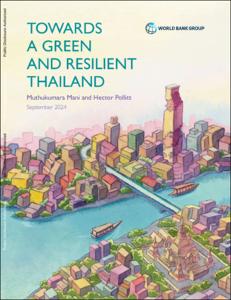Thailand has undergone a remarkable economic transformation, progressing from a low-income to an upper-middle-income country. However, this advancement comes with persistent challenges, including slowing economic growth, increasing climate vulnerabilities, and environmental degradation. As the nation navigates these pressing issues, the Thai government has introduced the Bio-Circular-Green (BCG) economy model to promote sustainable and competitive economic growth. Launched in 2021, this model leverages Thailand’s rich biodiversity and cultural heritage alongside technological innovation to create a resilient and forward-looking economic framework.
The urgency of climate action is evident as Thailand faces severe environmental risks, including rising sea levels, extreme weather events, and shifts in precipitation patterns. The country is highly susceptible to natural hazards such as floods, droughts, and coastal erosion, with climate impacts disproportionately affecting vulnerable populations. Rapid urbanization has further intensified these risks, exposing densely populated areas to flooding and other climate-related threats. Additionally, Thailand’s vital agricultural sector is under strain due to changing weather patterns, threatening food security and livelihoods, particularly for lower-income communities.
Beyond climate threats, environmental degradation is a growing concern. Deforestation, loss of biodiversity, and declining natural resources place additional pressure on the country’s long-term sustainability. Coastal erosion alone results in the loss of approximately two square kilometers of land each year, impacting economic activities and communities in coastal regions. These challenges highlight the need for an adaptive and forward-thinking economic strategy.
This publication introduces BCG+, an updated framework that expands upon Thailand’s original BCG model to address current and emerging challenges. By integrating climate resilience, sustainable resource management, and economic inclusivity, BCG+ aims to position Thailand for long-term prosperity. Using advanced modeling and analytics, this study provides a comprehensive, whole-of-economy perspective, assessing how Thailand can transition to a greener and more resilient economic model.
Through targeted policy interventions and cross-sector collaboration, the BCG+ economy offers a pathway toward a more sustainable future. This transition has the potential to enhance economic welfare, generate employment, and mitigate climate risks while safeguarding Thailand’s natural capital. By aligning economic growth with environmental sustainability, Thailand can build a future that is not only prosperous but also resilient to the uncertainties of climate change and global economic shifts.


